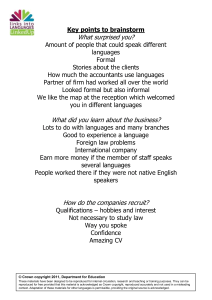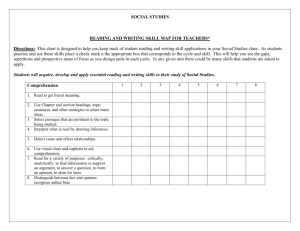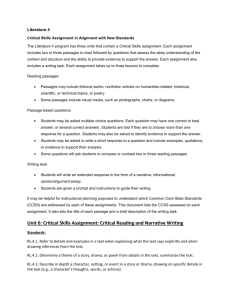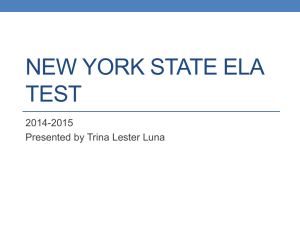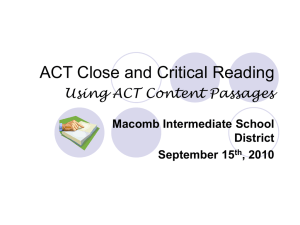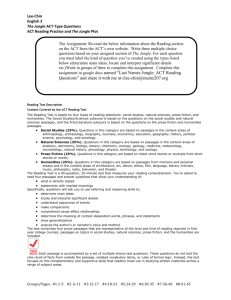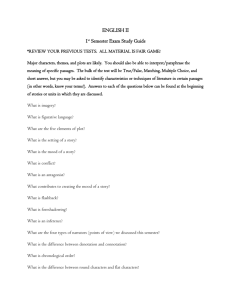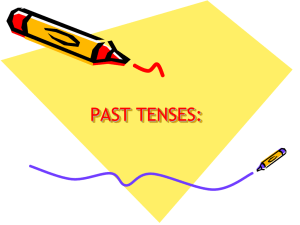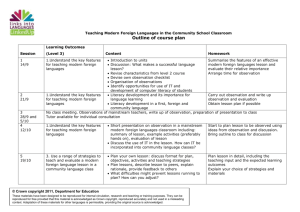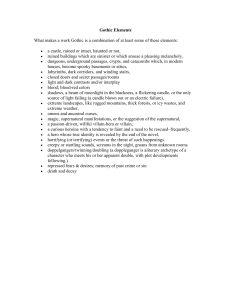Key Stage 3 AfL levels and target-setting sheet
advertisement
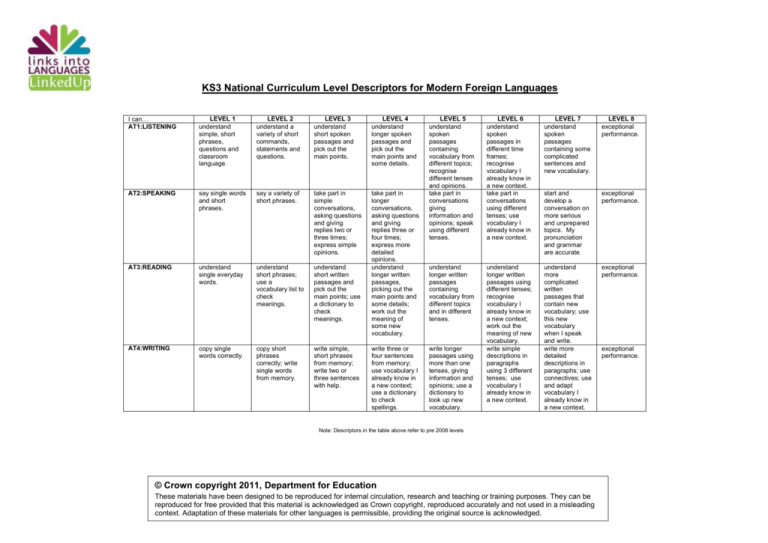
KS3 National Curriculum Level Descriptors for Modern Foreign Languages I can… AT1:LISTENING LEVEL 1 understand simple, short phrases, questions and classroom language. LEVEL 2 understand a variety of short commands, statements and questions. LEVEL 3 understand short spoken passages and pick out the main points. LEVEL 4 understand longer spoken passages and pick out the main points and some details. AT2:SPEAKING say single words and short phrases. say a variety of short phrases. take part in simple conversations, asking questions and giving replies two or three times; express simple opinions. AT3:READING understand single everyday words. understand short phrases; use a vocabulary list to check meanings. understand short written passages and pick out the main points; use a dictionary to check meanings. take part in longer conversations, asking questions and giving replies three or four times; express more detailed opinions. understand longer written passages, picking out the main points and some details; work out the meaning of some new vocabulary. AT4:WRITING copy single words correctly. copy short phrases correctly; write single words from memory. write simple, short phrases from memory; write two or three sentences with help. write three or four sentences from memory; use vocabulary I already know in a new context; use a dictionary to check spellings. LEVEL 5 understand spoken passages containing vocabulary from different topics; recognise different tenses and opinions. take part in conversations giving information and opinions; speak using different tenses. LEVEL 6 understand spoken passages in different time frames; recognise vocabulary I already know in a new context. take part in conversations using different tenses; use vocabulary I already know in a new context. LEVEL 7 understand spoken passages containing some complicated sentences and new vocabulary. LEVEL 8 exceptional performance. start and develop a conversation on more serious and unprepared topics. My pronunciation and grammar are accurate. exceptional performance. understand longer written passages containing vocabulary from different topics and in different tenses. understand longer written passages using different tenses; recognise vocabulary I already know in a new context; work out the meaning of new vocabulary. write simple descriptions in paragraphs using 3 different tenses; use vocabulary I already know in a new context. understand more complicated written passages that contain new vocabulary; use this new vocabulary when I speak and write. write more detailed descriptions in paragraphs; use connectives; use and adapt vocabulary I already know in a new context. exceptional performance. write longer passages using more than one tenses, giving information and opinions; use a dictionary to look up new vocabulary. Note: Descriptors in the table above refer to pre 2008 levels © Crown copyright 2011, Department for Education These materials have been designed to be reproduced for internal circulation, research and teaching or training purposes. They can be reproduced for free provided that this material is acknowledged as Crown copyright, reproduced accurately and not used in a misleading context. Adaptation of these materials for other languages is permissible, providing the original source is acknowledged. exceptional performance. KS3 AfL: reflection and target-setting based on exam results NAME: EXAM %: DATE: NC LEVELS: a.) The areas I have done well in and am pleased with are: 1. 2. 3. b.) The areas I have done less well in and think I could improve on are: 1. 2. 3. c.) The things I am going to do in order to ensure I improve in these areas are: 1. 2. 3. d.) Overall, I am pleased/disappointed with what I have achieved in this exam. © Crown copyright 2011, Department for Education These materials have been designed to be reproduced for internal circulation, research and teaching or training purposes. They can be reproduced for free provided that this material is acknowledged as Crown copyright, reproduced accurately and not used in a misleading context. Adaptation of these materials for other languages is permissible, providing the original source is acknowledged.
